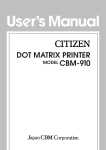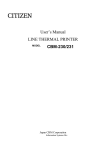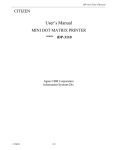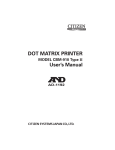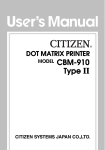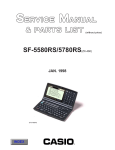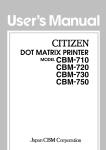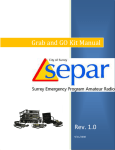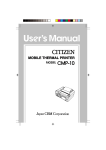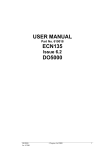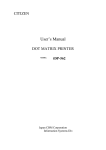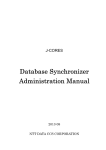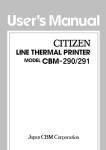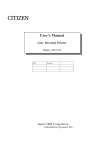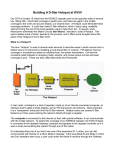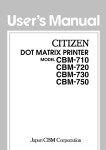Download User`s Manual - Goodson Imports
Transcript
CBM-910 User’s Manual CITIZEN User’s Manual MINI DOT MATRIX PRINTER MODEL CBM-910 Japan CBM Corporation Information Systems Div. CITIZEN 1/47 CBM-910 User’s Manual 1995.09.04(10-DCL)7 Declaration of Conformity Manufacturer's Name : Manufacturer's Address : Japan CBM Corporation : 1-1-7, Okubo, Shinjuku-ku, Tokyo 169, Japan Declare the Product Product Name Model Number (s) Dot Matrix Printer CBM-910 Series (CBM-910R, CBM-910P) (S.NO.95X0001 ) Conform to the following Standards LVD EMC : EN60950 : EN55022 : EN60555-2 : EN50082-1 : IEC801-2 : IEC801-3 : IEC801-4 :1992+A1+A2:1993 :1994 Class B :1987 :1992 :1991 4KV CD, 8KV AD :1984 3V/m, 27MHz-500MHz :1988 0.5KV Signal Line 1KV AC mains Supplementary Information "The product complies with the requirements of the Low Voltage Directive 73/23/EEC, 93/68/EEC and the EMC Directive 89/336EEC, 92/31/EEC, 93/68EEC" Place Tokyo, Japan Date Sept.1995 Signature Full Name : Koji Tanabe Position : General Manager R & D Department Europe Contact : Europe Liaison Office Kuruisweg 805, Holland Office Center Building 3-2132 NG Hoofddorp, the Netherlands Warning This is a Class A products. In a domestic environment this product may cause radio interference in which case the user may be required to take adequate measures. This declaration is applied only for 230V model. CITIZEN 2/47 CBM-910 User’s Manual IMPORTANT SAFETY INSTRUCTIONS * Read all of these instructions and save them for later reference. * Follow all warnings and instructions marked on the product. * Unplug this product from the wall outlet before cleaning. Do not use liquid or aerosol cleaners. Use a damp cloth for cleaning. * Do not use this product near water. * Do not place this product on an unstable cart, stand of table. The product may fall, causing serious damage to the product. * Slots and openings on the cabinet and the back or bottom are provided for ventilation. To ensure reliable operation of the product and to protect it form overheating, do not block or cover these openings. The openings should never be blocked by placing the product on a bed, sofa, rug of other similar surface. This product should never be placed near or over a radiator or heat register. This product should not be placed in a built-in installation unless proper ventilation is provided. * This product should be operated from the type of power source indicated on the marking label. If you’re not sure of the type of power available, consult your dealer or local power company. * Do not allow anything to rest on the power cord. Do not locate this product where the cord will be walked on. * In an extension cord is used with this product, make sure that the total of the ampere ratings on the products plugged into the extension cord do not exceed the extension cord ampere rating. Also, make sure that the total of all products plugged into the wall outlet dose not exceed 15 amperes. * Never push objects of any kind into this product through cabinet slots as they may touch dangerous voltage points or short out parts that could result in a risk of fire or electric shock. Never spill liquid of any kind on the product. * Except as explained elsewhere in this manual, don’t attempt to service this product yourself. Opening and removing those covers that are marked “Do Not Remove” may expose you to dangerous voltage points or other risks. Refer all servicing on those compartments to service personnel. * Unplug this product from the wall outlet and refer servicing to qualified service personnel under the following conditions: A. When the power cord or plug is damaged or frayed B. If liquid has been spilled into the product. C. If the product has been exposed to rain or water. D. If the product dose not operate normally when the operating instructions are followed. Adjust only those controls that are covered by the operating instructions since improper adjustment of other controls may result in damage and will often require extensive work by a qualified technician to restore the product to normal operation. E. If the product has been dropped the cabinet has been damaged. F. If the product exhibits a distinct change in performance, indicating a need for service. CITIZEN 3/47 CBM-910 User’s Manual IMPORTANT: This equipment generates, uses, and can radiate radio frequency energy and if not installed and used in accordance with the instruction manual, may cause interference to radio communications. It has been tested and found to comply with the limits for a Class A computing device pursuant to Subpart J of Part 15 of FCC Rules, which are designed to provide reasonable protection against such interference when operated in a commercial environment. Operation of this equipment in a residential area is likely to cause interference, in which case the user at his own expense will be required to take whatever measures may be necessary to correct the interference. CAUTION: Use shielded cable for this equipment. For Uses in Canada This digital apparatus does not exceed the class A limits for radio noise emissions from digital, apparatus, as set out in the radio interface regulations of the Canadian department of communications. CITIZEN 4/47 CBM-910 User’s Manual CONTENTS 1. INTRODUCTION............................................................................................................................................ 6 1.1 Features ................................................................................................................................................. 6 1.2 Accessories ............................................................................................................................................. 6 2. TYPE CLASSIFICATIONS ............................................................................................................................ 7 2.1 Type.......................................................................................................................................................... 7 2.2 AC Adapter .............................................................................................................................................. 7 2.3 Specifications .......................................................................................................................................... 8 3. EXTERNAL APPEARANCE AND PART DESCRIPTIONS ...................................................................... 10 3.1 External Appearance ............................................................................................................................ 10 .3.2 Part Descriptions.................................................................................................................................... 11 4. OPERATIONS ............................................................................................................................................... 12 4.2 Connection of the AC adapter.............................................................................................................. 12 4.2 Inserting the Printer Cover ............................................................................................................... 13 4.3 Inserting Ribbon Cassettes .................................................................................................................. 14 4.4 Inserting Paper .................................................................................................................................. 15 4.5 Self-Printing Function.......................................................................................................................... 16 4.6 Paper End. Mechanical Alarm ............................................................................................................. 17 4.7 General Remarks .................................................................................................................................. 18 5. PARALLEL INTERFACE ............................................................................................................................. 19 5.1 Specifications ........................................................................................................................................ 19 5.2 Connector Pin Assignment................................................................................................................... 19 5.3 Description of Input/ Output Signals.................................................................................................. 20 5.4 Electrical Characteristics..................................................................................................................... 21 6. SERIAL INTERFACE................................................................................................................................... 23 6.1 Specifications ........................................................................................................................................ 23 6.2 Connector Pin Assignment................................................................................................................... 24 6.3 Description of Input / Output signal................................................................................................... 24 6.4 Electrical Characteristics..................................................................................................................... 26 6.5 Error Detection ..................................................................................................................................... 27 7. DIP SWITCH SETTING............................................................................................................................... 28 7.1 Serial Interface Type ............................................................................................................................ 28 7.2 Parallel Interface Type ......................................................................................................................... 28 8. PRINT CONTROL FUNCTION................................................................................................................... 29 8.1 List of Control Codes............................................................................................................................ 29 8.2 Input Data Format ............................................................................................................................... 30 9. CHARACTER SET ........................................................................................................................................ 43 9.1 U.S.A. Specifications ............................................................................................................................. 43 9.2 Character code Table ............................................................................................................................ 44 10. EXTERNAL DIMENSIONS (in mm)......................................................................................................... 46 CITIZEN 5/47 CBM-910 User’s Manual 1. INTRODUCTION The CBM-910 is a dot-impact printer widely usable with various data communication terminals and measurement terminals. This printer, being extremely compact and equipped with extensive functions, is suitable for a wide range of applications. You are kindly requested to read this manual thoroughly to understand the product prior to actual use. 1.1 1. 2. 3. 4. 5. 6. 7. Features Compact desk-top dot matrix printer Light weight High speed printing Paper-end detecting function Conformity to RS-232C and Centronics. Low power consumption Low price 1.2 Accessories The following attachments are included in this set aside from the printer itself. Please confirm. Paper roll Ribbon cassette AC adapter User’s manual CITIZEN (1 roll) (1unit) (1 unit) (1 booklet) 6/47 CBM-910 User’s Manual 2. TYPE CLASSIFICATIONS 2.1 Type The product is categorized according to the naming plan indicated below. 24 P CBM-910 40 CBM-910 120 A F - R 24 R 230 F 230 Model Name Number of columns 24 : 24 columns/144 dots(MD-910) 40 : 40 columns/180 dots(MD-911) B - A Printer cover A : 60mm(Dia.) Paper roll B : 80mm(Dia.) Paper roll Adapter 120 : AC 120V 230 : AC 230V Interface P : Parallel(centronics) R : Serial(RS-232C) Character F : International (Note) *1) No. of digits varies for ROM. 2.2 AC Adapter Please use the exclusive adapter indicated below. 91AD-U (AC 120V) 91AD-E (AC 230V) CITIZEN 7/47 CBM-910 User’s Manual 2.3 Specifications Item 1 Printing method 2 Printing direction 3 Character configuration CBM-910-24* Dot matrix One-way printing (5 + 1) × 8 (W × H) 4 Number of columns per line 5 Printing speed 6 Character size (W × H) 7 Line pitch 8 Paper 9 Interface 10 Input buffer 11 Paper-end detection 12 Ink ribbon 13 Voltage 14 Power consumption 15 Weight 16 Reliability 17 Dimension 18 Operating temp. 19 Storage temp CITIZEN CBM-910-40* (4 + 0.5) × 8 24 columns: 144 dot/line 40 columns: 180 dot/line Approx. 2.5 line/sec. Approx. 1.8 lines/sec. 1.62 × 2.4 mm 1.08 × 2.4 mm 3.52 mm Paper Roll 57.5 ± 0.5(W) × 60 or 80 (Dia) mm Core ID f 12 ± 1 mm Core OD f 18 ± 1mm *1 Parallel Interface (Conformity to Centronics) or Serial Interface (RS-232C) 2K bytes Printing suspended when printing paper gets scarce. Purple (Private ribbon cassette) Service life: approx. 250,000 letters DC 7V ± 1V (Printing) Use exclusive adapter (DC 7V, 1.6A) Printing : approx. 7VA Stand-by : approx. 0.5VA Approx. 400g MCBF 1 million lines MCBF 700,000 lines 106(W) × 180(D) × 88(H) mm 0°C to 40°C -20°C to 60°C 8/47 CBM-910 User’s Manual *1. SPECIAL REMARKS CONCERNING PAPER SHAPE: The roll end(end part of the inside diameter) should satisfy the following (Refer to Drawing A): 1. Free of fold and well aligned to inside diameter 2. Free of flaps 3. Not adhered to core part(if there is one) RECOMMENDED PAPER: Single paper ……….45~55 kg/1,000 sheets/1,092´788 mm/1,000 sheets/ Copy paper…………non-carbon paper/original(34 Kg-paper)+copy 1 sheet (34 Kg-paper) Total thickness……0.13 mm or less CITIZEN 9/47 CBM-910 User’s Manual 3. EXTERNAL APPEARANCE AND PART DESCRIPTIONS 3.1 External Appearance CITIZEN 10/47 CBM-910 User’s Manual .3.2 Part Descriptions 1. Power Switch When switched ON, power is supplied to the Printer, starting the initializing operation. 2. Power Lamp Lighted when power is turned ON and goes out when turned OFF. 3. SEL Lamp Printer lights up in Select (ON LINE) state, and is put off in Deselect (OFF LINE) state. Printing operation is available only while this lamp is lit. 1) It blinks, for paper end, at 0.5 second intervals. Change paper. 2) On occurrence of any alarm state (blinking) due to any reason other than paper end, it starts to blink at 1/4 second intervals. 4. LF Switch Paper is fed when switch is pressed (de-select condition only). Used to supply paper or to insert some space in the output. 5. SEL Switch Printer is selected (ON-LINE) by pressing this switch. Printer is de-selected (OFF-LINE) by pressing the switch again. Also used to release alarm state. In Deselect state, if data still remain in the input buffer, they are all printed out. 6. Interface Connector Printer is connected to various hosts via cables. Please ensure that both the printer and the host are turned off before connecting. 7. Printer Cover Opened to change ribbon cassette and paper roll. CITIZEN 11/47 CBM-910 User’s Manual 4. OPERATIONS 4.2 Connection of the AC adapter (1) Make sure the power switch is OFF. (2) Insert the output plug of the AC adapter into the DC jack of the printer. (3) Insert the power plug of the AC adapter into a power outlet supplying the designated voltage. (Be sure to use an AC adapter for the power source.) CITIZEN 12/47 CBM-910 User’s Manual 4.2 Inserting the Printer Cover (1) Hold the protruding section at the rear of the printer cover and lift in the direction indicated. (2) Attach the cover by pressing downward after hooking the cover into the slots located in the front part. CITIZEN 13/47 CBM-910 User’s Manual 4.3 Inserting Ribbon Cassettes (1) Turn the printer off and remove the printer cover. (2) Press down on the Ribbon cassette while inserting the ribbon between the printing head and the platen. (3) Wind up the ribbon slack by turning the knob in the direction of the arrow. CITIZEN 14/47 CBM-910 User’s Manual 4.4 (1) (2) (3) (4) (5) (6) Inserting Paper Remove the printer cover. Ensure that the end of the paper is straight or angled as indicated in the diagram. Insert paper with the paper holder turned down in the arrow-indicated direction, hold the core. Insert paper into the slot of the printer mechanism. After turning on the printer, press the LF switch until 5 to 6 cm of paper is fed out of the printer mechanism. Then, attach the printer cover so the end of the paper comes out of the opening in the cover. (NOTE) Paper, if held aslant at the paper feed or the paper discharge side, may cause paper jamming. On occurrence of the above, immediately cut off power and slowly pull out remaining paper upright. CITIZEN 15/47 CBM-910 User’s Manual 4.5 Self-Printing Function (1) Test printing Turn on the power switch while holding the LF switch down. SEL lamp is held off during this stage, where BUSY signal is output. On completion of test printing, normal operation is recovered. (2) Dip switch information printing When the power is ON and the LF/SEL switch is pressed, the dip switch/communication method (including set details for serial) are printed. At this point, SEL lamp is held off where BUSY signals are output. Only with a 40-column type printer, following printing of dip switch information, printing is available in on-line in hexadecimal dump mode. (3) Hexadecimal dump mode All data sent from the host computer are printed in hexadecimal codes. When data for the last line are not sufficient for full one line, data of the last line are printed out with SEL switch being pressed and deselected (OFF LINE). This mode lasts till power is cut off. Example of Printing in Dump Mode CITIZEN 16/47 CBM-910 User’s Manual 4.6 Paper End. Mechanical Alarm (1) Paper end Paper shortage is detected and informed with SEL lamp blinking at 0.5 second intervals, where printing is suspended. At this time, power supply to the motor and printing solenoid is stopped with BUSY signals output in the host computer. To discontinue from Paper End state, insert new paper and press SEL switch twice. LF functions normally. By pressing SEL switch twice, you can print, without changing paper, data for one-line input buffer on the remaining page. (2) Mechanical alarm On occurrence of locked motor, any kind of trouble in the mechanism is suspected. Power supply to the motor and printing solenoid is stopped and BUSY signals are output to the host computer. SEL lamp is then blinked at 1/4 second intervals. To recover from alarm state, eliminate the trouble cause and press SEL switch twice. If it is in the course of printing, printing is started at the beginning of the interrupted line. (Content of the input buffer is still held.) However, this dose not apply in the case where power has been cut due to a severe trouble. CITIZEN 17/47 CBM-910 User’s Manual 4.7 General Remarks (1) Do not print without a ink ribbon properly inserted. This may cause damage on the print head. (2) Change ink ribbon before it becomes worn-out. Do not supplement ink. (3) Be careful not to drop, inside the main body, a clip, a setting pin, or any foreign matter. This will lead to machine failure. (4) Always place your printer on a flat stable table. If it not flat or stable, the main body will be displaced by vibrations while printing, creating possible danger. Holding it steadily is also important to avoid erroneous operation. (5) Never use organic solvent to clean the surface of the printer main body, (alcohol / thinner / benzine, etc.) (6) Paper may be damaged if left for long hours with a ribbon cassette inserted . Also, continuous printing, if conducted at a low temperature, may cause thin printing due to ink features. (7) Ribbon cassette, upon shipment, should not be mounted on a printer CITIZEN 18/47 CBM-910 User’s Manual 5. PARALLEL INTERFACE 5.1 Specifications (1) Data input system : (2) Control signal : (3) Compatible Connector : : 5.2 8 bit parallel (DATA 1-8) ACK, STB, BUSY, RESET, Printer side : 57LE-40360 (AMPHENOL or equivalent) Cable side : 57-30360 (AMPHENOL or equivalent) Connector Pin Assignment PIN 1 2 3 4 5 6 7 8 9 10 11 12 13 14 15 16 17 18 CITIZEN SIGNAL NAME STB DATA 1 DATA 2 DATA 3 DATA 4 DATA 5 DATA 6 DATA 7 DATA 8 ACK BUSY GND HI-LEVEL GND GND FRAME GND 19/47 PIN 19 20 21 22 23 24 25 26 27 28 29 30 31 32 33 34 35 36 SIGNAL NAME TWISTED PAIR GND TWISTED PAIR GND TWISTED PAIR GND TWISTED PAIR GND TWISTED PAIR GND TWISTED PAIR GND TWISTED PAIR GND TWISTED PAIR GND TWISTED PAIR GND TWISTED PAIR GND TWISTED PAIR GND TWISTED PAIR GND RESET GND CBM-910 User’s Manual 5.3 Description of Input/ Output Signals (1) Input signal * DATA 1………..8 bit parallel signal (positive logic) * DATA 2………..8 bit parallel signal (positive logic) * DATA 3………..8 bit parallel signal (positive logic) * DATA 4………..8 bit parallel signal (positive logic) * DATA 5………..8 bit parallel signal (positive logic) * DATA 6………..8 bit parallel signal (positive logic) * DATA 7………..8 bit parallel signal (positive logic) * DATA 8………..8 bit parallel signal (positive logic) * STB……………Strobe signal for reading out data (negative logic) * RESET………..Signal for resetting the entire unit (negative logic) (2) Output signal * ACK…………..8 bit data signal for requesting data. ACK is issued at the end of the BUSY signal (negative logic) * BUSY…………Signal indicating the printer is busy. Input new data when the signal is in “LOW” condition. (positive logic) * HI-LEVEL……Connected to Vcc via 3.3 kW resistance. (3) Timing chart T1 T2 T3 CITIZEN 2.7ms MIN 500mS MIN 10ms TYP (When power is supplied) 20/47 CBM-910 User’s Manual 5.4 Electrical Characteristics (1) Input signal level RESET signal are at TTL level, while inputs other than this are at HCMOS level. TTL Level “HIGH” level : 2.0V MIN “LOW” level : 0.8V MAX HCMOS Level “HIGH” level : 4.0V MIN “LOW” level : 1.0V MAX (2) Output signal level Output signal level is held at TTL. “HIGH” level : 2.4V MIN “LOW” level : 0.4V MAX (3) I/O Conditions INPUT SIGNALS (HC373 or equivalent) (HC04 or equivalent) (7407 or equivalent) CITIZEN 21/47 CBM-910 User’s Manual OUTPUT SIGNAL ACK BUSY (7407 or equivalent) CITIZEN 22/47 CBM-910 User’s Manual 6. SERIAL INTERFACE 6.1 Specifications (1) Synchronization : Asynchronous (2) Baud rate : 1200, 2400, 4800, 9600 Baud/sec (User selection) (3) Word configuration ·Start bit : 1 bit ·Data bit : 7 bit or 8 bit (User selection) ·Parity bit : odd, even, no parity (User selection) ·Stop bit : 1 bit or more (4) Signal polarity RS-232C * Mark = Logic”1”(-3 to –12V) * Space = Logic “0”(+3 to +12V) TTL (RESET) * H level = Logic”1” * L level = Logic”0” (5) Receive Data (RD) * Mark : 1 * Space : 0 (7) Transmit Data (TD) * Mark : 1 * Space : 0 (8) Received control (DTR signal) * Mark : Data transmission not possible * Space : Data transmission possible CITIZEN 23/47 CBM-910 User’s Manual 6.2 Connector Pin Assignment SIGNAL PIN 1 7 2 3 20 23 Note: 1. 6.3 SIGNAL NAME FG GND TD RD DTR RESET SIGNAL DIRECTION HOST-PRINTER ¬ ® ¬ ® FUNCTION RS-232C Frame ground Signal ground Transmit data Receive data Printer BUSY signal Printer reset signal O O O O O TTL O Signals for RS-232C are based on EIA RS-232C level. Applicable connector (D-sub connector) Printer side : 17LE-13250 (Anphenol equivalent) Cable side : 17JE-23250 (Anphenol equivalent) Description of Input / Output signal (1) Input signal 1) TD (TRANSMIT DATA) Serial transmission data signal. 2) RD (RECEIVE DATA) Serial receive data signal. 3) DTR (DATA TERMINAL READY) Input command or data while this signal is in ready state. Data input while the signal is BUSY will cause an overrun error to occur. Data can be provided to the input buffer even if the printer is printing. Busy state may also occur when power is applied, or during test printing, on-line, or when the printer is reset. 4) RES ET Signal resets the entire printer. (More than 4ms.) 5) FG(FRAME GND) Case ground. 6) GND Signal ground for the circuit. CITIZEN 24/47 CBM-910 User’s Manual (2) Data configuration (1) Start bit (1 bit) (2) Data bit (7 or 8 bit) (3) Stop bit (more than 1) CITIZEN 25/47 CBM-910 User’s Manual 6.4 Electrical Characteristics (1) RS-232C I/O Signals (RD / TD / DTR) *Input (RD / TD) Mark = (-8V): Space = (+8V): *Output (DTR) Mark = (-8V): Space = (+8V): stop bit start bit for Busy for Ready (2) TTL Circuit Input (RESET) [HOST] [CBM-910] Set to low when reset [HC04 or equivalent] CITIZEN 26/47 CBM-910 User’s Manual 6.5 Error Detection * Communication error Parity Error When parity nonconformity heaving been detected out of odd-even parity checking conducted when parity check is assigned. Framing Error When space state detected on detection of stop bit. Overrun Error When next following data having been transferred to receiving buffer register regardless of presence of data in that receiving buffer register. On occurrence of the above error, convert data at the time of occurrence into ‘ ‘ (7FH) to print it out. RECEIVING CONTROL AND BUFFERING The CBM-910 controls, on receipt of print data, receiving (DTR Control) in one-word unit. If the host disregards DTR and carries out data transmission at this time. over-run of receiving data may be resulted. This state should be avoided on the host’s responsibility. (The data discharging type host cannot follow this.) This is applicable when the host adopts a double buffer type transmitter. CITIZEN 27/47 CBM-910 User’s Manual 7. DIP SWITCH SETTING 7.1 Serial Interface Type Switch Function No. 1 Character 2 CR 3 Bit Length 4 Parity 5 Conditions Baud Rate (bps) Selection Switch No. 6 7 7.2 OFF ON International CR disregarded 8 bits Provided Odd 1200 2400 OFF OFF ON OFF CR + LF 7 bits Not provided Even Shipping Setting OFF OFF OFF ON OFF 4800 9600 OFF ON *Factory setting is 4800 bps. ON ON Parallel Interface Type Switch No. 1 2 CITIZEN Function Character CR OFF International CR disregarded 28/47 ON CR + LF Shipping Setting OFF OFF CBM-910 User’s Manual 8. PRINT CONTROL FUNCTION 8.1 List of Control Codes Symbol LF CR SI SO US RS CAN DC2 DC1 ESC + "B" ESC + "R" ESC + "/" ESC + "!" ESC + "&" ESC + "%" ESC + "K" FS + "W" + 1 FS + "W" + 0 CITIZEN Code (Hexadecimal) 0A 0D 0F 0E 1F 1E 18 12 11 1B/42 1B/52 1B/2F 1B/21 1B/26 1B/25 1B/4B 1C/57/1 1C/57/0 29/47 Function Line feed performed after printing. Line feed performed after printing. Standard letters assigned. Laterally enlarged letters assigned. Standard letters assigned. Laterally enlarged letters assigned. Data cancelled. Inverted prints assigned. Initial setting. Continuous paper feed assigned. International characters to be set. Sentences registered. Registered sentences printed. Individual patterns registered. Validity of registered letters. Bit image printing. × 4 enlarged letters assigned. × 4 enlarged letters assigned. CBM-910 User’s Manual 8.2 Input Data Format (1) Command for line feed after printing (CR / LF) With CR (0DH)/ LF (0AH) codes input, data in the print buffer are printed. Without data in the print buffer, only line feed is performed. This command is disregarded when the buffer is full. CR can be disregarded with the DIP SW. EX) 24-Column Model: [Receiving data] 123456789012345678901234567890 CR LF 123456789012345678901234567890 CR LF CR 123456789012345678901234567890 CR LF CR <Result of printing> 1. Dip Switch Setting at CR = CR+LF 123456789012345678901234 SPACE 123456789012345678901234 SPACE SPACE 123456789012345678901234 SPACE SPACE SPACE Head stop position 2. Dip Switch Setting at CR = disregarded 123456789012345678901234 123456789012345678901234 123456789012345678901234 SPACE Head stop position CITIZEN 30/47 LF CBM-910 User’s Manual (2) SI / SO and US / RS Commands SI / SO codes function in the same manner as US / RS as long as 8-bit data are assigned (serial communication data bit length), which, however, are divided, under 7-bit assignment, into SI (20H~7FH characters) print assignment and SO (A0H~FFH characters) print assignment functions. 1. Standard letter assignment (SI / US) command: With SI (0FH)/ US (1FH) codes input, lateral enlargement is cancelled and the data following are printed in standard letters. This command can cancel only lateral enlargement, which dose not apply to x 4 enlargement. 2. Laterally enlarged letter assignment (SO / RS) command: With SO (0EH)/RS (1EH) codes input in any columns, the data following are printed in prints enlarged double in width. With line feeding or SI / SR code input, this command is cancelled. Although standard and enlarged letters can be mixed within one line, automatic (buffer-full) printing takes place when the number of columns reaches 24 (or 40) counted in standard letters. [Receiving Data] SO 1234567860 CR SO 123 SI ABCD SO 123 SI ABC A SI CR SO 12 CR 12345678901B [Results of Printing] 1234567890 1 2 3 ABCD 1 2 3 ABC1 2 A1 2 3 4 5 6 7 8 9 0 1 B Mixed printing Although the last letter has been assigned to lateral enlargement, it is printed in standard letter as it is in 24th columns. (For 40-column mechanism this applied to 40th columns.) CITIZEN 31/47 CBM-910 User’s Manual (3) Data Cancel (CAN) Command With CAN (18H) code input, print data held within the line before input of the CAN code are all cancelled. [Receiving Data] SO 123456 CAN ABC CR [Results of Printing] ABC *As data “1 2 3 4 5 6” are cancelled without the command “SO” cancelled, “ABC” is printed in lateral enlargement. (4) Inverted Letter Assignment (DC2) Command When data are input with DC2 (12H) attached at the beginning of a line (invalid when attached to any other place), data following are all printed in inverted letters. To cancel this, input either DC2 again or DC1 (initial setting.) (5) Initial Setting (DC1) Command With DC1 (11H) input, various conditions set after power supply are cancelled and the state as at supply of power is restored. (6) Continuous Paper Feed Assignment (ESC + “B” + n) Command With ESC (1BH) + “B” (42H) + n code input, continuous paper feed at n-dot line is executed. The n, however, should be a even dot line of 4£ n £255. An odd number, if assigned to n, is regarded as an even number of “n-1”. If any scope other than the assignable scope has been assigned, this command is cancelled. With this command input and printing data existing in a input buffer, printing is performed. The printing line (10-dot line), however, is included in line feed volume “n”. With 4£ n £9, inline space is made “0”. CITIZEN 32/47 CBM-910 User’s Manual (7) International character setting ( ESC + “R” + n ) By entering the code ESC (1BH) + “R” (52H) + n, characters input hereafter are set to the characters for the following countries. n value and country setting n 0 1 2 3 4 Country U.S. France Germany England Denmark n 5 6 7 8 Country Sweden Italy Spain Japan With n other than those specified, the set value for the U.S. is assigned. NOTE) On supply of power, with the dip switch, U.S. (n=0) are set. (8) Sentence Registration (ESC + “/” + n ) Command With input of ESC (1BH) + “/” (2FH) + n + ‘registered sentence’ code, 24 (40)-bytes data following n are registered. Set a numeral of 1~8 to n. With any other numeral having been set, data following are regarded as normal printing data, where no registration takes place and printing conducted. When registration has already been made with the numeral set to n, the previous data are cancelled and the sentence newly set is registered. Data cannot exceed one line which should be ended with CR (0DH) or LF (0AH). To register sentences exceeding 24 (40) bytes, sentence up to 24 (40) bytes are registered, and the data following are printed out as printed data. The ESC command cannot be registered. CITIZEN 33/47 CBM-910 User’s Manual (9) Registered Sentence Printing (ESC + “!” + n) Command With ESC (1BH) + “!” (21H) + n code input, sentence already registered in the numeral assigned to n are printed. NOTE 1) As much as 24 (40) bytes of data can be registered. In case that 24 (40) columns are exceeded on printing (because of enlarged or x 4 letters having been assigned, etc.), printing is conducted up to 24(40)th column and the columns overflowed are printed in the next line. Be sure to make registration in consideration of printing results. NOTE 2) With x 4 enlargement or inverted letters executed at printing, printing continues in that setting unless they are cancelled. Application Example 1 [Receiving Data] ESC / This is a pen ESC / Is this a pen ? SO / It is a pen SO ! CR ………………. Sentence registered in 1. CR ………………. No registration made with 9. CR ……………….. Overwritten on sentence registered initially in 1. 1 ………………………………………….Printing of sentence registered in 1. <Registered State> 1 2 3 4 5 6 7 8 It is a p e n <Printing Result> Is th is a p e n ? It is a p e n ß- - - - Registration with 9 was invalid Immediately printed because not being within 1~8 scope. . Printed out with ESC + “!” + 1. CITIZEN 34/47 CBM-910 User’s Manual Application Example 2) [Receiving Data] ESC / 1 This is a pen ESC / 2 No.of columns has overflowed. CR Japan CBM Corporation Micro ESC / 4 SO CR CITIZEN SI enlargement CR Is this a pen ? ESC ! 4 ESC ! 1 ESC ! 2 NEW PRODUCTS CR canceled Impact dot printer CR <Registered State> 1 2 3 4 5 6 7 8 This is a pen Japan CBM Corporation Mi SO CITIZEN SI NEW PRODUCTS <Printed Result> Directly printed out since overflow has occurred. cro Is this a pen ? C I T I Z E N NEW PRODU CTS This is a pen Japan CBM Corporation Mi Impact dot printer CITIZEN 35/47 CBM-910 User’s Manual Application Example 3) [Receiving Data] ESC / 1 FS W 1 JAPAN CBM CR Registered in 4 enlarged letters. JAPAN CBM CR ESC ! ! JAPAN CBM CR <Registered State> 1 2 3 4 5 6 7 8 FS W 1 JAPAN CBM <Printed Result> JAPAN CBM J A PA N C B M J A PA N C B M CITIZEN Sentence registered in x 4 enlargement is printed. Because x 4 enlargement assignment has not been cancelled, this sentence is printed still in x 4 enlargement to the request of printing without setting. 36/47 CBM-910 User’s Manual (10) Character registration (ESC + “&”) command 1. For 24-column model (ESC + “&” + A1 + A2) Individual patterns can be registered by entering the code ESC + & + A1 + A2, then entering the pattern data. A maximum of 8 characters can be registered, and any address in the range of 20H to FFH can be used for the registration. However, if a new pattern is registered in an address already in use, existing data is cleared and the newly entered data becomes valid. If more than 8 characters are registered, all existing character registration is cleared. [Address setting] Specified address is matched to the character code and can be accessed likewise to the stored fixed character record. If a fixed character is defined in the specified address, the fixed character becomes invalid. A1 signifies the starting address for the registrations A2 is the ending address. [Method of data transmission] d-1 Single character registration Select the address to be defied (character code) from among 20H to FFH and designate is as A1. When registering a single character, starting and ending addresses match each other. That is, A1=A2. <Example> A6 ´ 6 dot matrix full dot pattern is to be registered in address 41H (code for the fixed character “A”). (Numerals are hexadecimal.) ESC + “&” + A1 + A2 + “Pattern data (6 byte)” 1B 26 41 41 FF·FF·FF·FF·FF·FF In the successive controls, a 6 ´ 8 dot matrix full dot is output whenever the character code 41H is specified. (Character “A” cannot be accessed.) d-2 Multiple character registration By repeating the single character registration, a maximum of 8 characters can be registered. When defining multiple characters in a successive address (character code), register pattern data for a maximum of 8 characters by designation A1 as the starting address and A2 as the ending address. Note) A1<A2, A2 – A1£ 7 CITIZEN 37/47 CBM-910 User’s Manual [Pattern Data Configuration](For 24-Column Model) Pattern data to be registered must consist of 6 bytes per character. That is pattern data configured by a 6 ´ 8 dot matrix is broken up into 6 vertically positioned units each of which is represented by 1 byte of data. All together, 6 bytes of data are transmitted. <Example> When transmitting the following data. [Printing of Registered Letters] To print registered character, in the same manner as printing other fixed characters, use the commands (CR, LF, ESC + “B” + n). 2. For 40-Column Model (ESC + “&” + C1 + A1 + A2) With ESC (1BH) + “&” (26H) + C1 + A1 + A2 code and the pattern data following input, a pattern is registered. Total 224 characters are available for registration into addresses of 20H ~ FFH. When two pattern data have registered in the same address, those initially registered are cleared and the new data alone are made valid. [Recognition of Use of Uppermost Bit] For recognition of use or non-use of the uppermost bit by a character to be registered, set data to Parameter C1. C1=0 (00H) : Uppermost bit not used. Other than C1=0 : Uppermost bit used. With 0 set to this parameter while the uppermost bit is in use, ´4 enlargement results in incomplete images for which the uppermost part is lacking. [Setting of Addresses] A1 : Registration starting address (20H~FFH) A2 : Registration ending address (20H~FFH) CITIZEN 38/47 CBM-910 User’s Manual [Pattern Data Configuration](For 40-Column Model) Pattern data to be registered must consist of 9 bytes per character. That is, pattern data configured by 9´8 dot matrix is broken up into 9 vertically each of which is represented by 1 byte of data. All together, 9 bytes of data are transmitted. <Example> When transmitting the following pattern data : Pattern data (9 bytes) As the model utilizes the half-dot printing method. It is not capable of positing successive dots in the printing (lateral) direction. Therefore, pattern, even if assigned in the position “*” to the right of “·” in the diagram above, will not be registered as pattern data. CITIZEN 39/47 CBM-910 User’s Manual NOTE) With 0 being set in “C1” parameter even if data have been registered in the uppermost position, letter image registered is made incomplete. (11) Registered Letter Valid / Invalid (ESC + “%” + n) Command Whether a registered pattern is valid or invalid is set with ESC (1BH) + “%” (26H) + n code being input. n = 1 (01H) : Registered pattern to be made valid. (Addresses for which no registration change has been conducted are taken as inside fixed characters.) n = 0 (00H) : Registered pattern to be made invalid. (Taken as in side fixed character sets.) The initial setting is 0 (inside fixed character). Even with letters already registered by pattern registration, printing of registered letters cannot be effectuated unless the patterns registered are mode valid with this command. NOTE) This command is applicable only to the 40-column printer. CITIZEN 40/47 CBM-910 User’s Manual (12) Bit Image Printing (ESC + “K” + n1 + n2 + n3) Command With ESC (1BH) + K (4BH) + n1 + n2 + n3 code being input, conversation from Text mode into Bit Image mode takes place. The n1/n2/n3 assigns amount of transmission of bit image data which follows these. Where, n1 represents the no. of bytes in lateral direction and n2 (lowermost)/n31 (uppermost) represent the no. of dot lines vertical direction. (Relations Between Data and Print-Out) (Parameter Assignable Range) Model 24 columns 40 columns n1 1~18 1~23 n2 0~255 0~255 n3 0~1 0~1 In case that assignment has been made out of the assignable range or n2 = n3 = 0 has been assigned, Bit Image mode is cancelled and Text mode starts. With this printer, on completion of read-in of 4-dot-line data or on completion of n1/ n2/n3 assigning data, lacking data are printed as spaces. NOTE 1) With n1 = 23 having been assigned in 40-column Model, 4 dots from the lowermost column (LSB) are made invalid. This is because the printing position in one line equals 180 dots. NOTE 2) On termination of bit image printing, Text mode is reinstated. CITIZEN 41/47 CBM-910 User’s Manual (13) ´4 Enlarged Letter Assignment (FS + “W” + 1) Command With FS (1CH) + “W” (57H) + 1 (01H) code input, ´4 enlarged letters are assigned. Data following this code are printed vertically and laterally twice enlarged. (14) ´4 Enlargement Cancel (FS + “W” + 0) With FS (1CH) + “W” (57H) + 0(00H) code being input, ´4 enlargement assignment is cancelled. NOTE 1) Although standard and laterally enlarged letters can coexist in one line, automatic (buffer-full) printing takes place on reaching to 24th (40th) column counted in standard characters. NOTE 2) With both ´4 enlargement and double-width having been assigned, ´4 enlargement has priority. Application Example) [Receiving Data] 1C 1C 1C W 1 0 ABC W W 0 A 123456789 1C 1C W W CR 1 1 123 CR 12345678901B <Printing Results> 1 2 3 4 5 6 7 8 9 ABC 1 2 3 A1 2 3 4 5 6 7 8 9 0 1 B The last letter, although in ´4 assignment, is printed in standard letter since it being in the 24th column. (For 40 column mechanism, this applies to the 40th column.) CITIZEN 42/47 CBM-910 User’s Manual 9. CHARACTER SET 9.1 U.S.A. Specifications CITIZEN 43/47 CBM-910 User’s Manual 9.2 Character code Table (*1 - *12 in the following code table are placed in the next page under ESC+R+n command.) CITIZEN 44/47 CBM-910 User’s Manual International Character Set Character Codes CITIZEN 45/47 CBM-910 User’s Manual 10. EXTERNAL DIMENSIONS (in mm) CITIZEN 46/47 CBM-910 User’s Manual CITIZEN 47/47















































